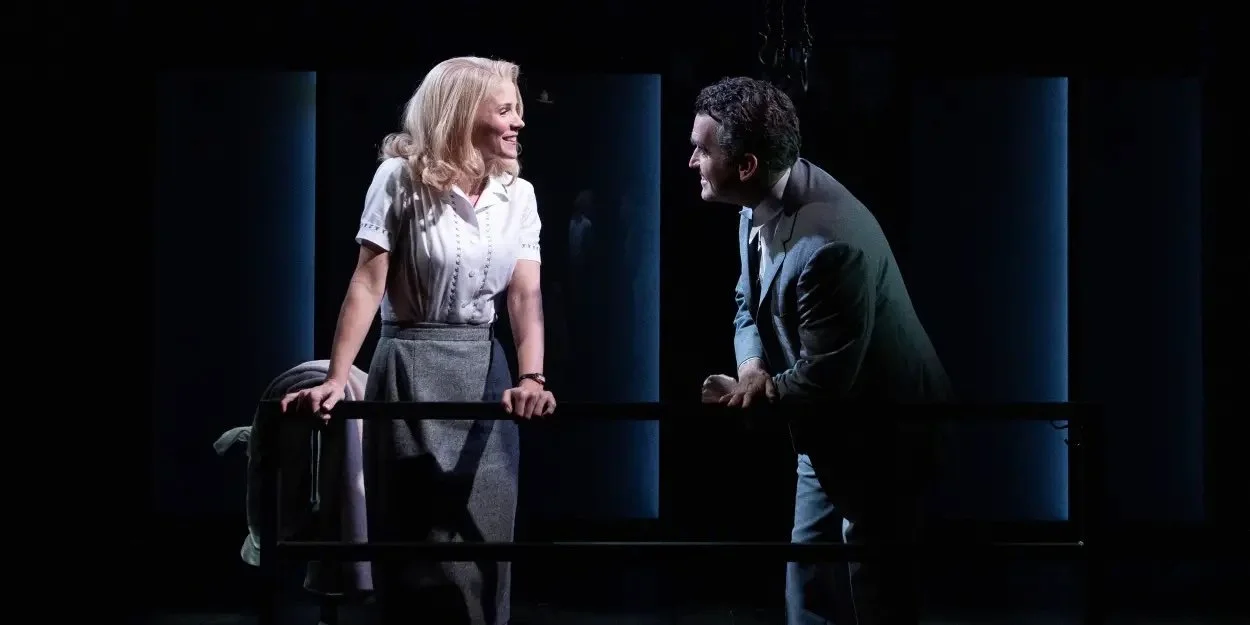Days of Wine and Roses
Kirsten (Kelli O’Hara) and Joe (Bryan d’Arcy James) fall in love in Days of Wine and Roses.
June 26, 2023
I was looking forward to Days of Wine and Roses the way I would look forward to a cocktail at my favorite bar – anticipating the right ingredients, perfectly blended by an expert mixologist resulting in a delightfully refreshing treat.
Sadly, the new musical at the Atlantic Theater Company did not provide the desired result. Despite containing the perfect ingredients, something was off – perhaps the pours were too light or too heavy, perhaps there was too much or too little ice, or maybe it was shaken when it should have been stirred. It wasn’t bad, but it wasn’t as delicious as it could have been.
The story of Days of Wine and Roses is undeniably timeless. First seen in J. P. Miller’s teleplay, it was adapted into a film in 1962, directed by Blake Edwards and starring Jack Lemmon and Lee Remick. With music by Adam Guettel and a book by Craig Lucas, this new adaptation chronicles the relationship of two San Francisco professionals as they descend the depths of alcoholism.
Joe, an ambitious public relations executive, first meets Kirsten, a secretary, at a work event. Dating begets drinking, despite Kirsten’s initial refusals – she doesn’t like the taste, and when Joe extols alcohol’s soothing effects, she cheerfully replies, “I already feel good!” But the sweetness of a Brandy Alexander changes the former teatotaler’s mind, and the pair quickly become each other’s enablers. A tragic ending appears to be inevitable for these liquor-soaked lovers.
If anyone could set this story to music, it would be Guettel, whose musical The Light in the Piazza transformed Elizabeth Spencer’s sparingly written novella into lush, soaring melodies offering haunting insights into characters’ minds. The score of Days of Wine and Roses does not soar. Its melodies lift up, but they have nowhere to land, and they lack characterization.
O’Hara has never sounded better, her golden soprano gliding to the rafters of the Linda Gross Theater, but the songs accomplish little in establishing Kirsten a fully-formed character or provide any insight into her downfall. She doesn’t suffer from a lack of opportunities. O’Hara performs in 14 of the 18 songs in the show. On their first date alone, Kirsten sings a sprightly song to Joe about an Atlantic Cable, and later in the evening, one cocktail in, she muses in melody about her longing for danger.
The two become co-dependent drinkers.
Perhaps the Atlantic Cable song is meant to display Kirsten’s intellectual curiosity, and her comment on the lack of female Senators an interest in politics. But even that is a stretch. Aside from Joe, her only significant relationship is with her father, the formidable and foreboding Byron Jennings, who takes an immediate disliking to Joe moments before Kirsten informs him they are married.
D’Arcy James does not fare better; instead, he is caught singing snippets of song that could (and should) have been dialogue, wasting his vibrant baritone. He and O’Hara share an impassioned chemistry and it’s easy to see why they fell for each other. In a jazzy cocktail-soaked duet they sing, “Two dolphins breakin’ a wave, two dolphins right to the grave are we.” Lizzie Clachan’s sets, Ben Stanton’s lighting and Dede Ayite’s costumes further establish the upbeat nightclub feel of the first few scenes.
The score is jazzy, as well as melancholy and operatic. Conductor Kimberly Grigsby leads a six-member band throughout Guettel’s carried compositions, which are unsettling in more ways than one. The melodies are ragged, with abrupt and unexpected conclusions. This could represent the chaotic minds of the increasingly drunk, but it makes for a challenging audience experience. It’s not easy to watch Joe and Kirsten, played by the intensely likable D’Arcy James and O’Hara, self-destruct. He is demoted and transferred, and she, a lonely housewife, accidentally sets fire to their apartment while day drinking. The two attempt to quit cold turkey, failing disastrously.
Moments of clarity and honesty do shine through, thanks to the stars’ exceptional performances, as well as the creators’ personal experiences. Both Lucas and Guettel have spoken of their histories with addiction and substance abuse – which makes the material’s failure to connect even more perplexing. Joe attempts to stay sober, even when Kirsten attempts to lure him off the wagon, but the damage is most evident in their daughter, Lila. Performed with clarity by Ella Dane Morgan, she demonstrates the independence that children of addicts are so often forced to develop. While Alcoholics Anonymous is not mentioned by name, Joe’s sponsor Jim Hungerford (David Jennings) represents the program, providing tough-love support to Joe after he is rebuffed repeatedly by Kirsten, who considers Joe’s recovery abandonment.
Kirsten attempts to convince Joe to start drinking again.
Steadfastly loyal, Joe refuses to give up on Kirsten, telling their daughter she will come home one day – even knowing that when Kirsten disappears for days, supposedly sleeping with men at bars. Kirsten’s experience is similarly glossed over. The judgment she would face for abandoning her family, let alone excessive drinking is never addressed. Her final encounter with Joe, allegedly taking place after a months-long absence, shows O’Hara looking as radiantly beautiful as ever, with no visible signs of drinking herself almost to death.
Nominated for five Academy Awards, the movie has been credited with contributing to the social acceptance of Alcoholics Anonymous. While Guettel and Lucas’ musical honors its source material, it does not improve upon it. Nothing new is gained from seeing the characters sing and dance, and the musical left this critic feeling hollow and disappointed – not that different from the morning after sipping on one too many poorly-mixed cocktails.



